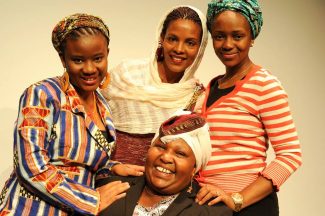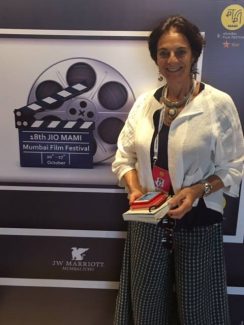The Baulkham Hills African Ladies Troupe (Ros Horin 2016): Australia
Viewed by Alicia Huhn at the Santa Barbara Film Festival 2017.
“A passion project” I believe is the way filmmaker Ros Horin described this film. Ros Horin brings over 30 years of Live Theatrical expertise to this moving theatre documentary drama film. It is a film that fills a void and creates a voice for all people but particularly these four women who’s story would otherwise go untold. These four women from Sierra Leon, Eritrea, and Kenya Africa will amaze you with their strength and beauty. They are braver than most. They didn’t set out to be that way, it is simply their story. An inspiration to see how art and the creative process can change a mind, a heart, a life or the entire world. The telling of a story, an ancient art form, are told for different reasons and in different ways like song, dance, talking, acting, writing. African people have always been know for their story telling songs and dances that enact and reflect traditions of harvest or marriage ceremonies etc. But what about the stories no one wants to hear? Tales of war and torture and rape? How can a woman who has never been there tell their story? How can the ones who have been there tell it in front of the world? Their children? Their families? These women collectively have come together to tell their stories in a way that the telling is part of the process of healing itself. These women endear themselves to you by the way they live their everyday lives as survivors. They humbly, tremblingly, and triumphantly tell the story of how their innocence was stolen violently, how they escaped and how they have fought to live a life of freedom after such trauma. Their stories are unfortunate and even horrific but Ros Horin has a way of judiciously and carefully embarking on their journey of discovery and healing with them. Ros is more than a theater director or a filmmaker, she is a champion and a leader for women’s rights and human rights. Ros candidly shares how she struggled with the psychological ethics of asking trauma victims to retell therefore relive the horrific abuse they endured. “Would it be too much?”, she asks herself repeatedly in the begining and at several points along the way. She paused and drew in, seeking guidance from Psychological trauma experts. Yordanos the woman from Eritrea, stopped a couple times during the production because the telling of the trauma was indeed overwhelming and re-traumatizing. The girls go on without her, sadly, but honor her wishes to withdraw. Later she rejoins after several months of battling depression, she is dropped of by her therapist after deciding to continue. She bravely and candidly shares with the world the delicate process of learning to face the painful truth while still finding a way to live life day to day in a new non traumatic way. She remains with the troupe and in the end becomes freed by the process of overcoming her fears and pain and suffering. She explains in the end that she no longer feels the shame of the abuse, she feels that she is triumphant and can do anything now. This is a beautifully told story of how amazingly fragile and at the same time amazingly tough and resilient the human spirit is. This film is being promoted as part of a campaign to raise awareness for all trauma victims. The film is next airing at the March 8th Sunraysia Mallee Ethnic Communities Council, Mildura. “This is one of the core messages of the film – the power of women coming together to support each other, make a difference, and create positive change in the world.” – as found on the website: http://africanladiestroupe.com/
About this entry
You’re currently reading “The Baulkham Hills African Ladies Troupe (Ros Horin 2016): Australia,” an entry on Student Film Reviews
- Published:
- 02.21.17 / 10pm
- Category:
- Documentary, Films, Santa Barbara Film Festival 2017


No comments
Jump to comment form | comments rss [?]